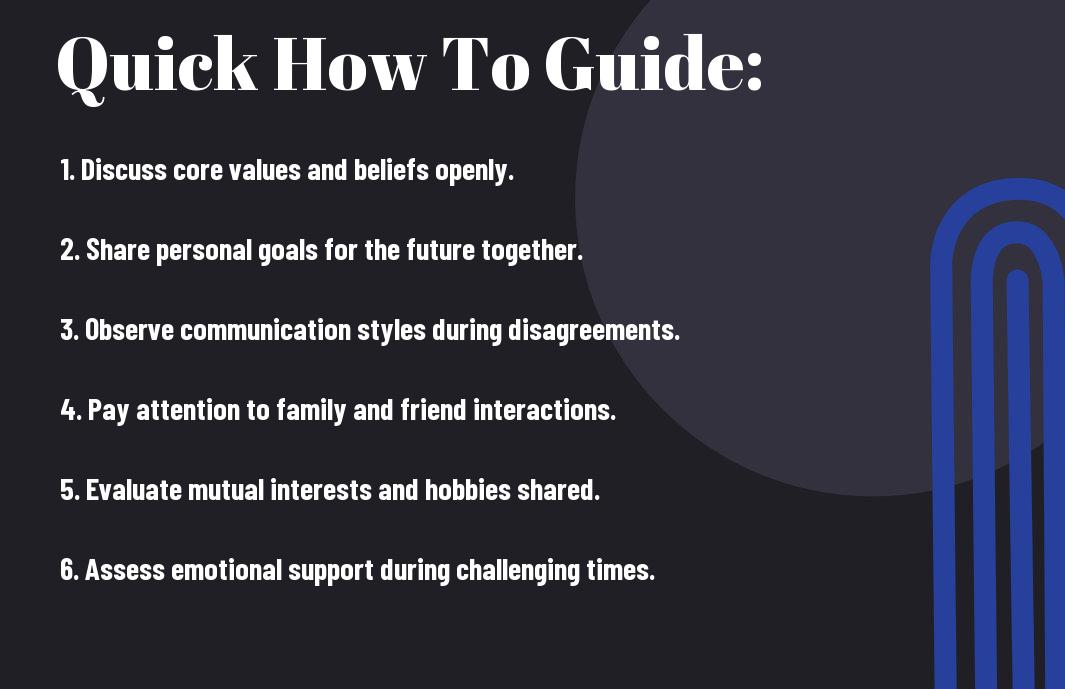Relationship success often hinges on understanding compatibility from the start. As you navigate the early stages of dating, it’s vital to evaluate how well your values, interests, and life goals align with your partner’s. This post will guide you through key indicators to assess compatibility, helping you make informed decisions about your future together. By tuning into these signs, you’ll enhance your chances of building a fulfilling and lasting connection.
Identifying Key Compatibility Factors
For a successful relationship, it’s crucial to identify key compatibility factors that align with your partner. Understanding these factors can help you assess whether your connection is built on a solid foundation. Key aspects to consider include:
- Values
- Communication styles
- Interests and hobbies
- Emotional availability
- Family dynamics
Recognizing these compatibility factors early can save you from potential heartache down the line.
Shared Values
Factors that define your relationship often stem from shared values. These core beliefs guide your choices, interactions, and overall vision for life. When you both prioritize similar values, such as honesty, respect, and family, it fosters a deeper connection and understanding between you two.
Life Goals
To ensure long-term compatibility, aligning your life goals with your partner is vital. Discussing your aspirations can reveal whether you’re both heading in the same direction. This might include your career ambitions, family planning, or dreams of travel and adventure.
Values play a significant role in the decisions you make. If your partner dreams of traveling the world while you aspire to settle down, it may create tension in the relationship. Therefore, having open discussions about your individual and shared goals will help you both establish a roadmap that supports each other’s dreams and ambitions harmoniously.

Effective Communication Strategies
If you want to identify compatibility early in your relationship, implementing effective communication strategies is imperative. Building a strong connection often hinges on how well you convey your thoughts and feelings. By adopting clear communication techniques, you can understand each other better, minimize misunderstandings, and strengthen the bond between you and your partner.
Open Dialogue
Communication should be a two-way street. An open dialogue allows both partners to express their thoughts and feelings without fear of judgment. Encourage each other to share opinions, and create a safe space where honesty is valued. This openness fosters trust and helps you gauge how well your values and lifestyles align.
Active Listening
One of the best ways to enhance communication is through active listening. When you truly listen, you are not just hearing the words but also understanding the emotions and intentions behind them. This process helps you connect on a deeper level, revealing each other’s needs and desires.
Strategies for active listening include maintaining eye contact, nodding to show engagement, and paraphrasing what your partner has said. Avoid interrupting or formulating your response while they are speaking; instead, focus entirely on them. This practice not only demonstrates your commitment but also encourages your partner to reciprocate, reinforcing mutual understanding.

Assessing Emotional Intelligence
Your ability to assess emotional intelligence in yourself and your partner can significantly impact your relationship. Emotional intelligence involves understanding and managing emotions effectively, which is necessary for fostering connection and empathy. To explore this further, you can Decode Your Relationship Compatibility in One Hour. Higher emotional intelligence typically indicates a strong ability to navigate relationship dynamics and can help you identify compatibility early on.
Understanding Each Other’s Feelings
If you and your partner can openly discuss and validate each other’s feelings, it may be a strong indicator of compatibility. Effective communication about emotions builds trust and deepens your bond. Be aware of how both of you respond to emotional situations; this insight can guide your relationship’s longevity and overall health.
Conflict Resolution Styles
Some couples handle conflicts passionately, while others may choose to withdraw. Recognizing your individual conflict resolution styles can highlight compatibility and show how you both approach challenges. This awareness paves the way for constructive discussions, ultimately strengthening your relationship.
Each partner’s conflict resolution style affects how issues are addressed during disagreements. One person may prefer direct confrontation while the other favors compromise or avoidance. By understanding these styles, you can work together to find common ground. A successful relationship often thrives on recognizing and respecting each other’s approaches, adapting them to create harmonious solutions during conflicts.
Evaluating Lifestyle Compatibility
Unlike what many believe, lifestyle compatibility plays a significant role in relationship success. It encompasses various aspects of life, such as social preferences, daily routines, and long-term goals. Assessing these elements early on can help determine if you and your partner are aligned in ways that matter most. Understanding lifestyle differences allows you to have honest discussions and make informed decisions about the future of your relationship.
Social Activities
Compatibility in social activities is often a reflection of shared values and interests. Engaging in similar activities strengthens your bond and enhances your enjoyment of time spent together. Discuss your preferences for gatherings, whether you prefer intimate dinners or lively parties, to ensure you both share similar social circles and can navigate them comfortably.
Daily Routines
On the other hand, daily routines can greatly influence your relationship dynamics. When your habits, schedules, and priorities align, you create a supportive environment that fosters growth and harmony. Assess how you approach mornings, work commitments, and leisure time to identify potential challenges or synergies.
Routines often dictate how much time you can spend with each other and how you engage in daily life. Conversations about your wake-up times, meal preferences, and evening activities help to reveal compatibility in lifestyle choices. By identifying when your routines overlap, you can discover opportunities to enjoy each other’s company and build a comfortable life together.
Recognizing Red Flags
Keep an eye out for red flags that signify potential issues in your relationship. These warning signs can manifest in various forms, such as controlling behavior, lack of respect for your boundaries, or a dismissive attitude towards your feelings. By identifying these inconsistencies early on, you give yourself the opportunity to evaluate whether the relationship is truly healthy for you.
Behavioral Patterns
Now, observe the behavioral patterns unfolding in your partner’s actions. Are they quick to anger, overly critical, or consistently negative? These traits can indicate deeper issues that might surface later. Consistent negative behaviors can create an unhealthy atmosphere, making it vital for you to assess whether these patterns align with your values and emotional well-being.
Incompatibility Signs
An important aspect of recognizing potential issues is identifying signs of incompatibility. These can include differing life goals, communication styles, or even fundamental values. If you consistently find yourselves at odds over decisions or future plans, it may indicate deeper incompatibility that could strain the relationship.
Plus, incompatibility can also show itself in how you handle conflict or express affection. If one of you prefers open discussions while the other shuts down during disagreements, this lack of alignment can create frustration. It’s vital to assess how well your differing styles can coexist and whether you both are willing to make adjustments for the relationship to thrive.
Tips for Nurturing Compatibility
Many aspects can help you nurture compatibility in your relationship. By focusing on shared values and interests, you can create a strong bond. Here are some tips:
- Communicate openly and honestly.
- Engage in activities that you both enjoy.
- Be supportive of each other’s goals.
- Practice active listening and empathy.
- Regularly express appreciation for one another.
Perceiving these elements can significantly strengthen your connection.
Engaging in Shared Experiences
Now is the perfect time to engage in shared experiences that foster compatibility. Your relationship can grow as you explore new activities together, whether that’s trying a cooking class, traveling, or enjoying games. Discovering mutual interests will enhance your bond and allow you to create lasting memories.
Regular Check-Ins
To further nurture compatibility, prioritize regular check-ins to discuss your feelings and relationship dynamics. These moments offer a chance to address concerns, celebrate progress, and ensure that you are both aligned with each other’s needs.
Compatibility thrives on open dialogue, and regular check-ins are an effective way to keep the lines of communication clear. By setting aside time to discuss your emotions and experiences, you create a safe space for vulnerability, ultimately encouraging growth and understanding. This practice enables both partners to reflect on their feelings, paving the way for strengthened compatibility as your relationship evolves.
Summing up
Now that you know how to spot compatibility early in a relationship, focus on identifying shared values, communication styles, and mutual interests. Pay attention to how you and your partner handle conflicts and support each other’s goals. Assessing these elements can provide valuable insights into the long-term potential of your relationship. By staying attuned to these factors, you can build a strong foundation that fosters growth and connection, ensuring a healthier partnership as you move forward.









